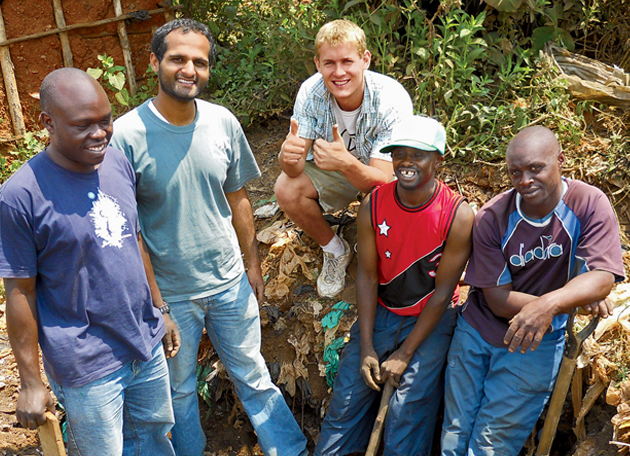
A native of India, Ani Vallabhaneni, BSBA ’02, BSCS ’02, knows firsthand about the lack of sanitation in developing countries.
An estimated 2.5 billion people lack access to adequate sanitation in the developing world, and 1.6 million children die each year from diarrheal disease as a result.
Now, as co-founder and CEO of Sanergy, Vallabhaneni is working to alleviate this problem by “providing sanitation infrastructure in Kenyan slums and then converting the waste to valuable byproducts like energy and fertilizer.”
The idea for Sanergy originated in 2009 while Vallabhaneni was pursuing an MBA at Massachusetts Institute of Technology (MIT). In his first semester there, he pitched the idea for Sanergy to a few friends, and they developed a business plan.
The team entered the 100K Entrepreneurship Competition at MIT. After competing against hundreds of other companies, Sanergy ended up winning the grand prize — $100,000 to help make Vallabhaneni’s dream a reality.
“Convincing a jury that they should put their money into sanitation in the slums of Africa, rather than the next Facebook or Google seemed like an impossible feat,” he says. “We were shocked when we heard Sanergy announced as the winner.”
“At each step, Sanergy creates jobs, opportunity and profit while addressing serious social and economic needs.”
—Ani Vallabhaneni
The business decided to first implement its plans in Nairobi, Kenya. According to Vallabhaneni, residents of the Kenyan slums have three options for sanitation. One, they can collect their own waste in plastic bags, which many then dispose of in public areas. Two, they can pay to use makeshift toilets that drain into pits and waterways, polluting the environment. Or three, they can pay to use public toilets in commercial areas.
“These public toilets are often located far from home — which is not only a time-consuming inconvenience, but can also put women and children at risk for sexual assault and rape,” Vallabhaneni says.
Housed in cement enclosures, Sanergy toilets will provide the three key elements that users in the slums say they want from good sanitation: hygiene, affordability and accessibility.
The toilets are manufactured at workshops in Nairobi and franchised to local entrepreneurs.
“We provide them with the branding, marketing, training and support to run a successful franchise,” Vallabhaneni says. “We also provide them with a daily waste collection service that safely removes the waste from the community and brings it to our central processing facility, where it can be converted to high-margin byproducts such as electricity and fertilizer.”
In addition to improving sanitation, Sanergy creates jobs.
“We employ people from the community to do marketing, training, operations, manufacturing, waste collection and waste processing,” Vallabhaneni says. “At each step, Sanergy creates jobs, opportunity and profit while addressing serious social and economic needs.”
Vallabhaneni has more than 10 years experience working with startup companies. While a freshman at Washington University, he co-founded OmniMedia Studio, an IT services company. Within four years, the business expanded to 20 employees with offices in the United States and India.
“My time at Washington University gave me the opportunity to learn in the classroom and immediately apply those lessons in my startup,” Vallabhaneni says. “I could then bring the dilemmas from my work back into the classroom for discussion.”
After graduation, Vallabhaneni worked for four years at a health-care technology firm. In 2008, he had the opportunity to turn around a chain of dialysis clinics for low-income patients in the Philippines. “This allowed me to combine my professional skills with my passion for social issues,” he says.
Vallabhaneni plans to stay in Nairobi for five to eight years — time to grow Sanergy enough so that the local managers can take over — before beginning work on another startup company.
“Opportunity is always where others perceive risk,” he says. “Despite all of its issues, Africa will be an incredible growth market in the next decade. My hope is that Sanergy continues to grow and expand as a profitable enterprise well beyond my involvement and that we can replicate it across Africa and the world.”
Blaire Leible Garwitz is associate editor of this magazine.
Comments and respectful dialogue are encouraged, but content will be moderated. Please, no personal attacks, obscenity or profanity, selling of commercial products, or endorsements of political candidates or positions. We reserve the right to remove any inappropriate comments. We also cannot address individual medical concerns or provide medical advice in this forum.